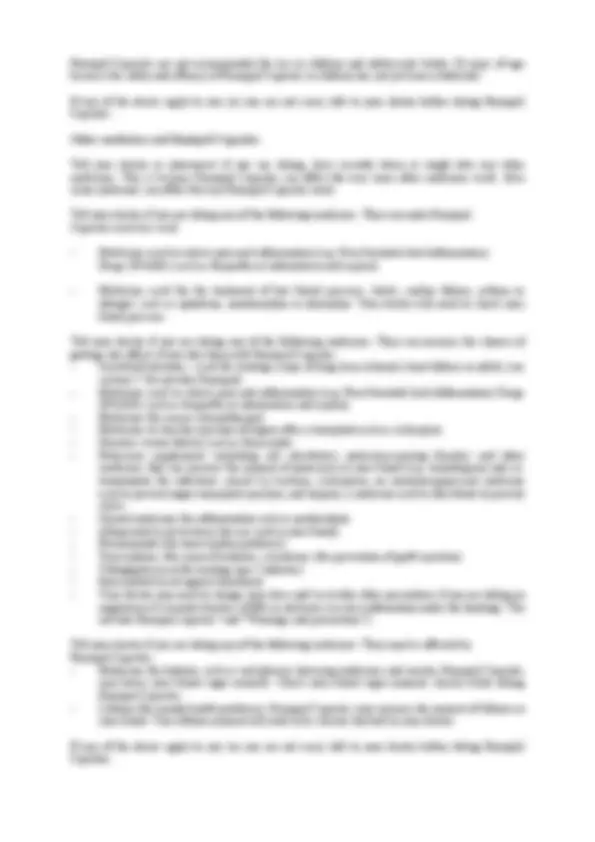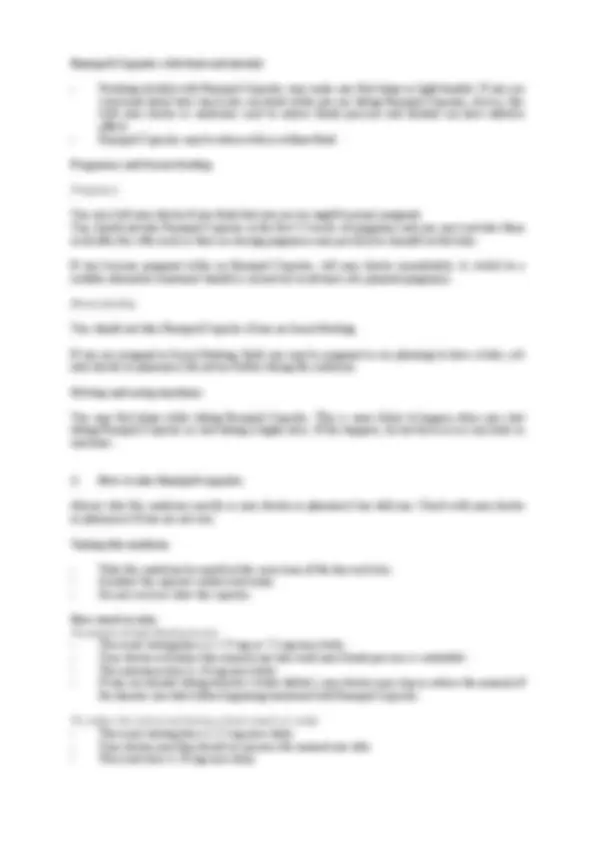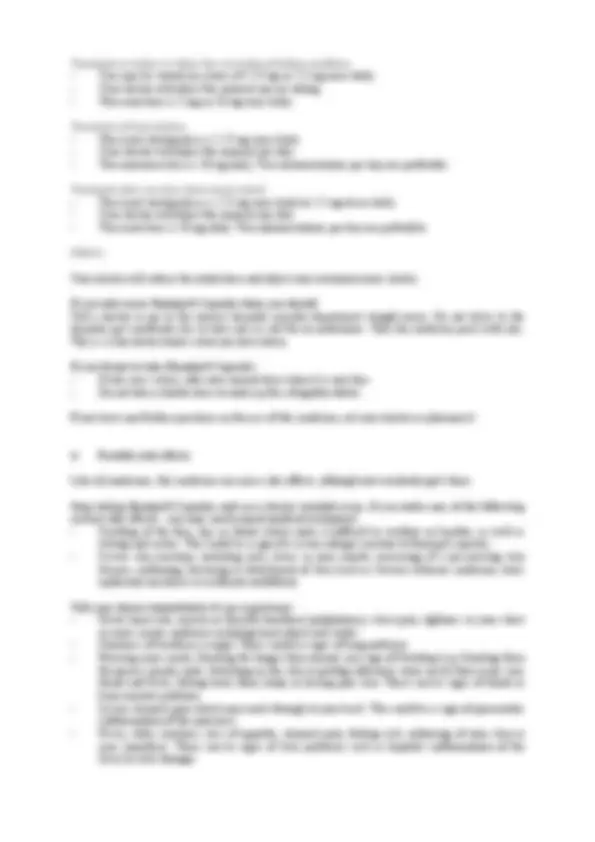Download Ramipril Capsules: Package Leaflet and Instructions for Use and more Summaries Medicine in PDF only on Docsity!
Package leaflet: Information for the user
Ramipril 1.25 mg Capsules Ramipril 2.5 mg Capsules Ramipril 5 mg Capsules Ramipril 10 mg Capsules
(Ramipril)
Read all of this leaflet carefully before you start taking this medicine because it contains important information for you.
- Keep this leaflet. You may need to read it again.
- If you have any further questions, ask your doctor or pharmacist.
- This medicine has been prescribed for you only. Do not pass it on to others. It may harm them even if their symptoms are the same as yours.
- If you get any sideeffects, talk to your doctor orpharmacist. This includes any possible side effects not listed in this leaflet. See section 4.
In this leaflet
- What Ramipril Capsules is and what it is used for
- What you need to know before you take Ramipril Capsules
- How to take Ramipril Capsules
- Possible side effects
- How to store Ramipril Capsules
- Contents of the pack and other information 1. What Ramipril capsules is and what it is used for
Ramipril Capsules contains a medicine called ramipril. This belongs to a group of medicinescalled ACE inhibitors (Angiotensin Converting Enzyme Inhibitors).
Ramipril Capsules work by:
- Decreasing your body’s production of substances that could raise your blood pressure
- Making your blood vessels relax and widen
- Making it easier for your heart to pump blood around your body.
Ramipril Capsules can be used:
- To treat high blood pressure (hypertension)
- To reduce the risk of you having a heart attack or stroke
- To reduce the risk or delay the worsening of kidney problems (whether or not you have diabetes)
- To treat your heart when it cannot pump enough blood to the rest of your body (heart failure)
- As treatment following heart attack (myocardial infarction) complicated with heart failure.
2. What you need to know before you take Ramipril capsules
Do not take Ramipril Capsules:
- if you are allergic to ramipril, any other ACE inhibitor medicine or anyof the other ingredients of this medicine listed in section 6. Signs of an allergic reaction may include a rash, swallowing or breathing problems, swelling of your lips, face, throat or tongue.
- If you have ever had a serious allergic reaction called “angioedema”. The signs include itching, hives (urticaria), red marks on the hands, feet and throat, swelling of the throat and tongue, swelling around the eyes and lips, difficulty breathing and swallowing.
- If you have taken or are currently taking sacubitril/valsartan, a medicine used to treat a type of long-term (chronic) heart failure in adults, as the risk of angioedema (rapid swelling under the skin in an area such as the throat) is increased.
- If you are having dialysis or any other type of blood filtration. Depending on the machine that is used, Ramipril Capsules may not be suitable for you.
- If you have kidney problems where the blood supply to your kidney is reduced (renalartery stenosis).
- During the last 6 months of pregnancy (see section below on “Pregnancy and breastfeeding”)
- If your blood pressure is abnormally low or unstable. Your doctor will need to make this assessment.
- If you have diabetes or impaired kidney function and you are treated with a blood pressure lowering medicine containing aliskiren.
- If you are taking any of the following medicines, the risk of angioedema may be increased:
- Racecadotril, a medicine used to treat diarrhoea; ● Medicines used to prevent organ transplant rejection and for cancer (e.g., temsirolimus, sirolimus, everolimus). ● Vildagliptin, a medicine used to treat diabetes.
Do not take Ramipril Capsules if any of the above apply to you. If you are not sure, talk to your doctor before taking Ramipril Capsules.
Warnings and precautions Talk to your doctor or pharmacist before taking Ramipril capsules:
- If you have heart, liver or kidney problems
- If you have lost a lot of body salts or fluids (through being sick (vomiting), having diarrhoea, sweating more than usual, being on a low salt diet, taking diuretics (watertablets) for a long time or having had dialysis).
- If you are going to have treatment to reduce your allergy to bee or wasp stings (desensitisation).
- If you are going to receive an anaesthetic. This may be given for an operation or anydental work. You may need to stop your RamiprilCapsules treatment one daybeforehand; ask your doctor for advice.
- If you have high amounts of potassium in your blood (shown in blood test results).
- If you are taking medicines or have conditions which may decrease sodium levels in your blood. Your doctor may carry out regular blood tests, particularly for checking the levels of sodium in your blood especially if you are elderly.
- If you are taking medicines that may increase the risk of angioedema, a serious allergic reaction, such as mTOR inhibitors (e.g. temsirolimus, everolimus, sirolimus), vildagliptin, neprilysin (NEP) inhibitors (such asracecadotril) or sacubitril/valsartan. For sacubitril/valsartan, see section 2 “Do not take Ramipril”.
- If you have collagen vascular disease such as scleroderma or systemic lupus erythematosus. You must tell your doctor if you think that you are (or might become) pregnant. Ramipril capsules are not recommended in the first 3 months of pregnancy and may cause seriousharm to your baby after 3 months of pregnancy,(see section below on “Pregnancy and breastfeeding”).
- If you are taking any of the following medicines used to treat high blood pressure:
- an angiotensin II receptor blocker (ARBs) (also known assartans-for example valsartan, telmisartan, irbesartan), in particular if you have diabetes-related kidney problems.
- aliskiren
Your doctor may check your kidney function, blood pressure, and the amount of electrolytes (e.g. potassium) in your blood at regular intervals. See also information under the heading“Do not take Ramipril capsules”.
Children and adolescents
Ramipril Capsules with food and alcohol
- Drinking alcohol with Ramipril Capsules may make you feel dizzy or light-headed. If you are concerned about how much you can drink while you are taking RamiprilCapsules, discuss this with your doctor as medicines used to reduce blood pressure andalcohol can have additive effects.
- Ramipril Capsules may be taken with or without food.
Pregnancy and breast-feeding
Pregnancy
You must tell your doctor if you think that you are (or might become) pregnant. You should not take Ramipril Capsules in the first 12 weeks of pregnancy and you must not take them at all after the 13th week as their use during pregnancy may possibly be harmful to the baby.
If you become pregnant while on Ramipril Capsules, tell your doctor immediately. A switch to a suitable alternative treatment should be carried out in advance of a planned pregnancy.
Breast-feeding
You should not take Ramipril Capsules if you are breast-feeding.
If you are pregnant or breast-feeding, think you may be pregnant or are planning to have a baby, ask your doctor or pharmacist for advice before taking this medicine.
Driving and using machines
You may feel dizzy while taking Ramipril Capsules. This is more likely to happen when you start taking Ramipril Capsules or start taking a higher dose. If this happens, do not drive or use any tools or machines.
3. How to take Ramipril capsules
Always take this medicine exactly as your doctor or pharmacist has told you. Check with your doctor or pharmacist if you are not sure.
Taking this medicine
- Take this medicine by mouth at the same time of the day each day.
- Swallow the capsules whole with water.
- Do not crush or chew the capsules.
How much to take Treatment of high blood pressure
- The usual starting dose is 1.25 mg or 2.5 mg once daily.
- Your doctor will adjust the amount you take until your blood pressure is controlled.
- The maximum dose is 10 mg once daily.
- If you are already taking diuretics (water tablets), your doctor may stop or reduce theamount of the diuretic you take before beginning treatment with Ramipril Capsules.
To reduce the risk of you having a heart attack or stroke
- The usual starting dose is 2.5 mg once daily.
- Your doctor may then decide to increase the amount you take.
- The usual dose is 10 mg once daily.
Treatment to reduce or delay the worsening of kidney problems
- You may be started on a dose of 1.25 mg or 2.5 mg once daily.
- Your doctor will adjust the amount you are taking.
- The usual dose is 5 mg or 10 mg once daily.
Treatment of heart failure
- The usual starting dose is 1.25 mg once daily.
- Your doctor will adjust the amount you take.
- The maximum dose is 10 mg daily. Two administrations per day are preferable.
Treatment after you have had a heart attack
- The usual starting dose is 1.25 mg once daily to 2.5 mg twice daily.
- Your doctor will adjust the amount you take.
- The usual dose is 10 mg daily. Two administrations per day are preferable.
Elderly
Your doctor will reduce the initial dose and adjust your treatment more slowly.
If you take more Ramipril Capsules than you should Tell a doctor or go to the nearest hospital casualty department straight away. Do not drive to the hospital, get somebody else to take you or call for an ambulance. Take the medicine pack withyou. This is so the doctor knows what you have taken.
If you forget to take Ramipril Capsules
- If you miss a dose, take your normal dose when it is next due.
- Do not take a double dose to make up for a forgotten tablet.
If you have any further questions on the use of this medicine, ask your doctor or pharmacist.
4. Possible side effects
Like all medicines, this medicine can cause side effects, although not everybody gets them.
Stop taking Ramipril Capsules and see a doctor straight away, if you notice any of the following serious side effects - you may need urgent medical treatment:
- Swelling of the face, lips or throat which make it difficult to swallow or breathe, as wellas itching and rashes. This could be a sign of a severe allergic reaction to Ramipril capsules.
- Severe skin reactions including rash, ulcers in your mouth, worsening of a pre-existing skin disease, reddening, blistering or detachment of skin (such as Stevens-Johnsonsyndrome, toxic epidermal necrolysis or erythema multiform).
Tell your doctor immediately if you experience:
- Faster heart rate, uneven or forceful heartbeat (palpitations), chest pain, tightness in yourchest or more serious problems including heart attack and stroke
- Shortness of breath or a cough. These could be signs of lung problems
- Bruising more easily, bleeding for longer than normal, any sign of bleeding (e.g. bleedingfrom the gums), purple spots, blotching on the skin or getting infections more easily than usual, sore throat and fever, feeling tired, faint, dizzy or having pale skin. These can besigns of blood or bone marrow problems
- Severe stomach pain which may reach through to your back. This could be a sign of pancreatitis (inflammation of the pancreas).
- Fever, chills, tiredness, loss of appetite, stomach pain, feeling sick, yellowing of yourskin or eyes (jaundice). These can besigns of liver problems such as hepatitis(inflammation of the liver) or liver damage.
Please tell your doctor if any of the following gets serious or lasts longer than a few days.
- Difficulty concentrating
- Swollen mouth
- Blood tests showing too few blood cells in your blood
- Blood tests showing less sodium than usual in your blood
- Concentrated urine (dark in colour), feel or are sick, have muscle cramps, confusion and fits which may be due to inappropriate ADH (anti-diuretic hormone) secretion. If you have these symptoms contact your doctor as soon as possible
- Fingers and toes changing colour when you are cold and then tingling or feeling painfulwhen you warm up (Raynaud's phenomenon)
- Breast enlargement in men
- Slowed or impaired reactions
- Burning sensation
- Change in the way things smell
- Hair loss.
Reporting of side effects If you get any side effects, talk to your doctor, pharmacist or nurse. This includes any possible side effects not listed in this leaflet. You can also report side effects directly via the Yellow Card Scheme at: www.mhra.gov.uk/yellowcard By reporting side effects you can help provide more information on the safety of this medicine.
5. How to store Ramipril capsules
Keep this medicine out of the sight and reach of children. Do not store above 25°C. Store in the original packaging.
Do not use this medicine after the expiry date which is stated on the carton and the blister orthe tablet container after EXP. The expiry date refers to the last day of that month.
Do not throw away anymedicines via wastewater or household waste. Ask your pharmacist how to throw away medicines you no longer use. These measures will help protect the environment.
6. Contents of the pack and other information
What Ramipril Capsules contain
- The active substance is ramipril.
- The other ingredients are: starch (pregelatinised), gelatin, polyethylene glycoland the colourings, black iron oxide (E172) and titanium dioxide (E171).
- The 2.5mg capsules also contains Brilliant blue (E 133), Carmosine (E 122), Yellow iron oxide (E 172) and 5mg capsules also contains Ponceau 4R (E 124), Brilliant blue (E 133), yellow iron oxide (E 172) and 10mg capsules also contain the colourings indigo carmine (E132) and yellow iron oxide (E172). The printing ink on the capsules contains the following additional ingredients: shellac, butyl alcohol and propylene glycol.
What Ramipril Capsules looks like and contents of the pack Ramipril 1.25 mg Capsules: light grey in colour, with “R” marked on the capsule cap and 1.25 onthe capsule body. Ramipril 2.5 mg Capsules: light green cap marked “R” and a light grey capsule body marked 2.5. Ramipril 5 mg Capsules: green cap marked “R” and a light grey capsule body marked 5. Ramipril 10 mg Capsules: dark green cap marked “R” and a light grey capsule body marked 10.
Pack sizes: The capsules are supplied in blister packs of 7, 21, 28, 30, 50 and 100 capsules. Not all pack sizes may be marketed.
Marketing Authorisation Holder & Manufacturer: Brown & Burk UK Ltd 5 Marryat Close Hounslow West Middlesex TW4 5DQ United Kingdom
This leaflet was last updated in June 2020
This leaflet does not contain all the information about your medicine. If you have any questionsor are not sure about anything, ask your doctor or pharmacist.
















